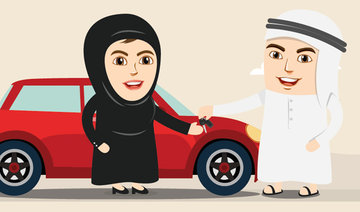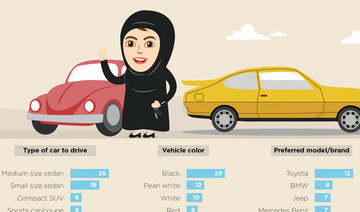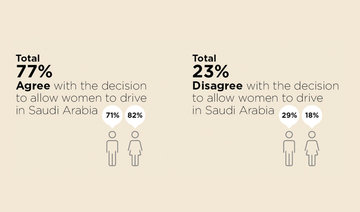LONDON: One of the biggest benefits of allowing women in Saudi Arabia to drive is expected to be the positive effect it will have on the Kingdom’s economy.
That was a key finding of an Arab News/YouGov survey of the Saudi public, in which 42 percent said the main impact of lifting the driving ban is that it will enable more women to find employment, which should boost the overall economy.
A third said the most significant impact would be an increase in household income — presumably due to women being able to find new forms of employment, as well as families no longer having to pay for drivers.
The economic benefits of the move to allow women to drive — which comes into force in June — were viewed as more significant than women’s fight for greater equality. Just 28 percent of the poll respondents said the biggest impact would be ensuring women felt empowered and equal to men.
The initial economic effects of the decision will be felt by car producers, said analysts.
“In the short term, the main discernible impact will probably be a temporary jump in car purchases as families buy additional vehicles, boosting consumer spending,” said Jason Tuvey, Middle East economist at Capital Economics.
Economists agree with the Arab News poll findings, which suggest that women driving could give a long-term economic boost. “The decision should make it easier for women to seek and acquire employment, which should help to boost the female labor force participation rate which, at around 20 percent, is among the lowest in the world,” said Tuvey.
As of the third quarter 2016, there were a total of 12,376,699 people employed in Saudi Arabia, including non-Saudis, according to government statistics. Women accounted for just 1,482,284 of those employed, of which 835,726 were Saudi nationals.
Hala Kudwah, Saudi Arabia financial services consulting leader at PwC, forecasts a change in consumption patterns in the Kingdom, such as diverting the salaries paid to drivers to other activities such as in retail, tourism and entertainment.
She sees women playing a greater role in the small- and medium-sized enterprises (SME) sector.
“Forty percent of startups launched in the Kingdom are owned by women and therefore there is potential for more engagement in this sector,” said Kudwah.
“The decision to lift the ban on women driving is an economic necessity triggered by the Kingdom’s transformation that is sweeping the nation economically and socially.”
The tangible economic benefits of the decision could go some way to making the new legislation more palatable among members of Saudi Arabia’s more conservative society, analysts suggest.
“The Saudi population is more accepting because it sees the strategic and economic relevance, it appreciates the incremental milestones leading to it,” Kudwah said.
However, there are plenty more “hurdles” for women in the Kingdom to overcome to gain greater equality, said Tuvey.
“In particular, the guardianship system means that a male guardian still has the authority to take a number of critical decisions on the behalf of women,” he said.
Employment drive
While the overall Saudi economy is tipped to benefit from the move to allow women to drive, the impact on certain businesses is still unclear.
Vitali Bielski, senior consultant at consultancy firm Frost & Sullivan, said he sees a short-term impact on companies such as Uber and Careem, which could see their revenue streams come under threat as more women learn to drive.
“Until recently a large part of the population was forced to rely on ride-hailing applications. These apps are really popular in the region,” he said.
Yet those two companies have embraced the move, announcing plans to recruit women drivers.
Careem, which plans to open 100,000 jobs to female drivers in the wake of the decree, said that far from losing business, the company stands to benefit from an energized economy.
“While it’s true that 70 percent of our users in Saudi are female, our success and growth in the country is mainly because we offer a safe, reliable and affordable service,” said Abdulla Elyas, cofounder and chief people officer at Careem.
“When we have more women who are employees and entrepreneurs, and the whole country has increased mobility, the domestic economy gets energized and that’s when transportation services will be in more demand.
“As with the possibility of registering women Captains (drivers), we will be able to welcome new female customers who feel more comfortable riding with another female.”
Uber also intends to champion women drivers in Saudi Arabia by opening its first “female partner support center” and recruiting women to work for the company by the end of the year.
• For full report and related articles please visit: #SaudiWomenCanDrivePoll




































